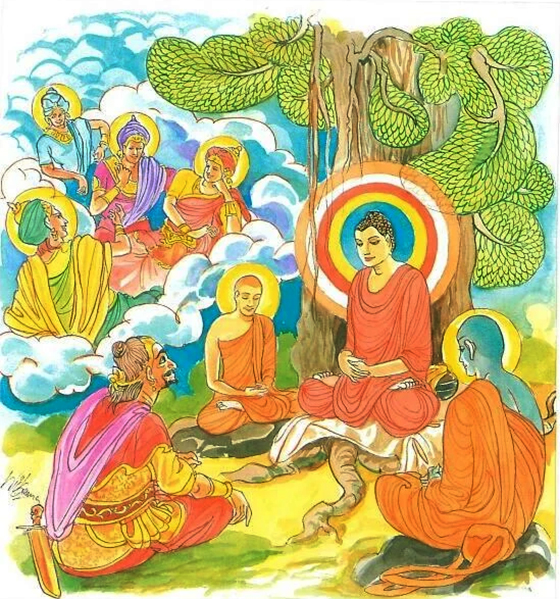Verse 200: Indeed we live very happily, without any anxiety (i.e., without greed, ill will and ignorance); like the Abhassara brahmas we shall live on delightful satisfaction (piti) as our food.
- natthi kincanam: without any anxiety, here it means without greed, ill will and ignorance (raga, dosa and moha).
-
deva abhassara: Abhassara brahmas are the radiant brahmas of the abode of the second Rupavacara Jhana Brahmaloka.
The Story of Mara
The Buddha uttered Verse (200) of this book in a brahmin village known as Pancasala (village of five halls), with reference to Mara.
On one occasion, the Buddha saw in his vision that five hundred maidens from Pancasala village were due to attain Sotapatti Fruition. So he went to stay near that village. The five hundred maidens went to the riverside to have a bath; after the bath they returned to the village fully dressed up, because it was a festival day. About the same time, the Buddha entered Pancasila village for alms-food but none of the villagers offered him anything because they had been possessed by Mara.
On his return the Buddha met Mara, who promptly asked him whether he had received much alms-food.
The Buddha saw the hand of Mara in his failure to get any alms-food on that day and replied, “You wicked Mara! It was you who turned the villagers against me. Because they were possessed by you they did not offer any alms-food to me. Am I not right ?” Mara made no reply to that question, but he thought that it would be fun to entice the Buddha back to the village and get the villagers to insult the Buddha by making fun of him. So he suggested, “O Buddha, why don’t you go back to the village again? This time, you are sure to get some food.”
Just then, the five hundred village maidens arrived on the scene and paid obeisance to the Buddha. In their presence, Mara taunted the Buddha, “O Buddha, since you received no alms-food this morning, you must be feeling the pangs of hunger!” To him the Buddha replied, “O wicked Mara, even though we do not get any food, like the Abhassara brahmas who live only on the delightful satisfaction (piti) and bliss (sukha) of jhana, we shall live on the delightful satisfaction and bliss of the Dhamma.”
Then the Buddha spoke in verse as follows:
Verse 200: Indeed we live very happily, without any anxiety (i.e., without greed, ill will and ignorance); like the Abhassara brahmas we shall live on delightful satisfaction (piti) as our food.
At the end of the discourse, the five hundred maidens attained Sotapatti Fruition.
Dhammapada Verse 200
Mara Vatthu
Susukham vata jivama
yesam no natthi kincanam1
pitibhakkha bhavissama
deva abhassara2 yatha.
Source: Tipitaka








Swarna Kumar
Happy new year dear jendhamuni
Sanjay sohra
Open the lock pleaseeeeee